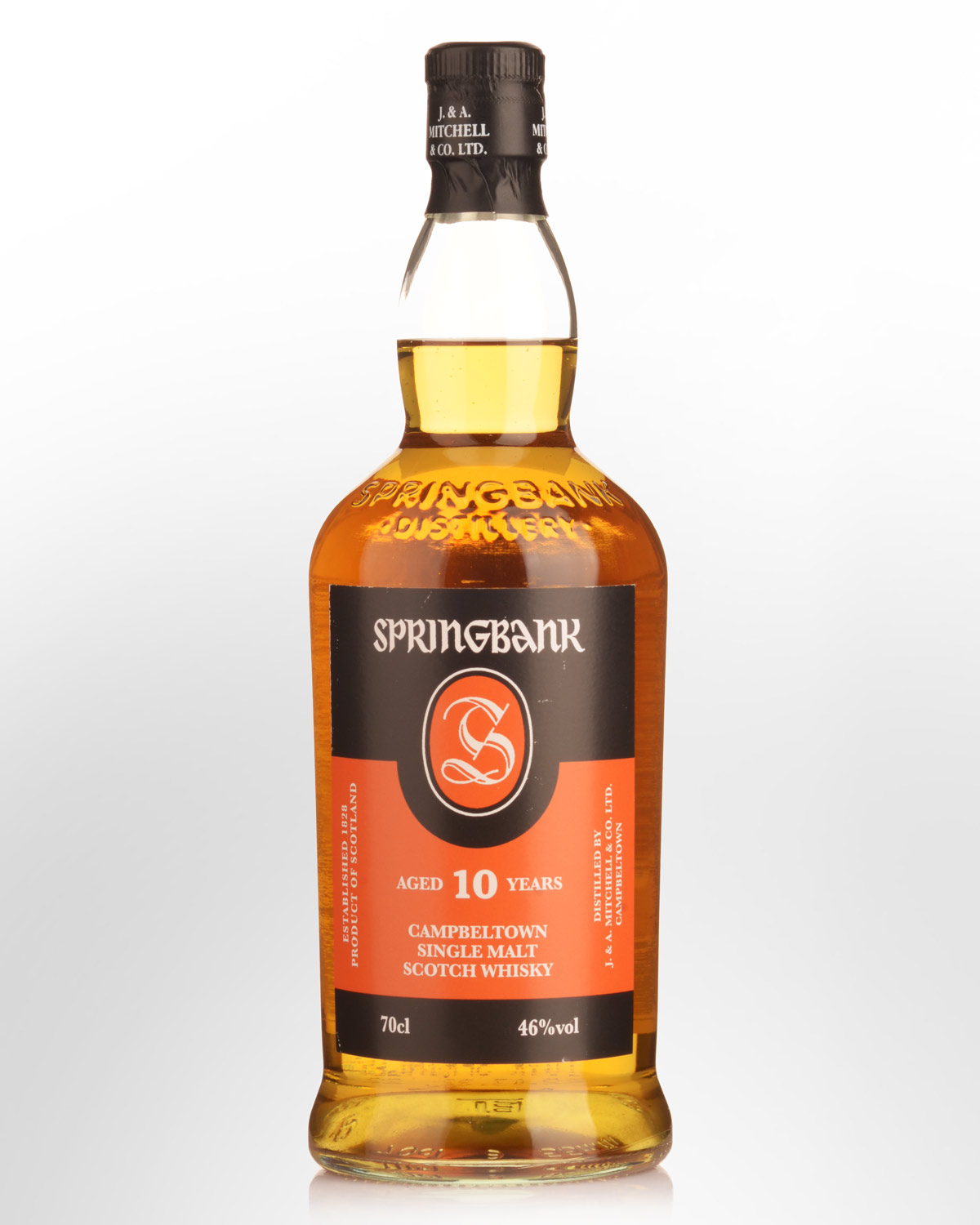
- 93
- Limit Six per customer
- Nick's Import
Springbank 10 Year Old Single Malt Scotch Whisky (700ml) - 2022 bottling
Why Springbank is One of the World’s Great Distilleries.
(And why you should know about it.)
Collectors note: Unlike previous editions, this version was released without the original box. This is Springbank's contribution to saving the environment. Springbank's labels almost always arrive with minor wearing and markings, most often to the top of the front labels. This is unavoidable. If you are likely to be disappointed by minor label scuffing, we recommend you don't buy these whiskies.
There are distilleries in Scotland that inspire a sense of reverence due to their singular commitment from generation to generation. No fads, no computers, no fancy technology. ‘Traditional’ is a word that comes to mind, but its present day connotations with hackneyed Scotch Whisky marketing hype do this particular distillery an injustice.
Last year a visitor to Springbank described the experience as “...stepping into a Victorian distilling textbook”. You could think of it like a monastery or Amish farm house. We've met many seasoned whisky lovers who don't know about Springbank, but then, it doesn’t follow industry fashions or court publicity. There are good reasons why this is presently one of the most interesting distilleries happening in the world of Scotch whisky today. Springbank is small - in fact, one of Scotland's smallest distilleries. They’re also family owned. Both factors making Springbank inherently flexible. Small batches and experimental runs are their stock and trade. More importantly, they maintain complete control of the production process - from their own water source, to the floor maltings, through to a seventy hour fermentation which is one of the slowest in the industry.
At the heart of Springbank’s mostly superlative output is an artisanal distilling technique. They operate a form of ‘partial triple distillation’, that is, everything is distilled two and a half times instead of twice - the latter being standard for Scotch Whisky. The wash still is fired from the bottom by live flame (also very rare). It takes attention and skill to manage charges like this. Mess it up and you get undesirable burnt flavours. Get it right and you can introduce some interesting toasty grain characteristics to the whisky as parts of the mash fall on 'hot spots' and are gently ‘roasted’ on the base of the still. While the technique has always been highly regarded by the Scots it's rarely applied mainly for reasons of efficiency. When other distilleries switched from direct flame heating to solely steam coil heating in the 1960s, 70s and 80s many managers reported a change in the character of their spirit, and rarely for the better. To prevent solids within the wash burning at the bottom of the still, it’s fitted on the inside with copper chains, called rummagers, which rotate on an arm. The method of continuously scraping solids including yeast and barley has always been considered an important factor in the whisky's eventual flavour. It goes without saying that chill filtration and artificial colouring are no where to be seen here.
In his recent book, “101 Whiskies to Try before You Die”, Ian Buxton describes Springbank's 10 Year Old as “Arguably the most traditional Scotch Whisky...a must have whisky if ever there was one”. In fact, most of what’s been released from Springbank since the early 1990s could be classified as good to great. The beautiful thing about this company is that there’s always something else on the horizon. From triple distilled, to heavily peated and cask strength expressions, to wood finished whiskies, the latter of which Springbank are the modern day masters of. Their whiskies also have a reputation for holding age extremely well (if you want a clear cut example of this, seek out ‘Campbeltown Loch’ on this website - a dramatically under valued 30 Year Old blend with the vibrancy of a something half its age).
For the history buffs, Springbank’s location is also worth mention. Campbeltown was home to a big fishing fleet, and no less than 37 distilleries during the 19th century. Following the Excise Act of 1823 taxes were reduced to such an extent that legal distilling at last became competitive against smuggling. This really was the beginning of the golden years for Campbeltown distillers, who hastily began applying for licences. Subsequently Campbeltown became an epicentre for malt whisky, earning it the nickname 'Whisky Capital of the World.' Levels of production were so high that it was inevitable the bubble would burst. The early part of the 20th century saw changes which had a detrimental effect on the Campbeltown whisky trade. Overconfident in their Glasgow monopoly, some Campbeltown distillers became complacent, putting the emphasis on quantity, not quality, which led to the production of inferior spirit. This, coupled with a post-war economic depression and prohibition in the United States took its toll and by 1930 only three distilleries survived. ‘Rieclachan’ closed in 1934, leaving only Springbank and Glen Scotia. Springbank since opened a sister distillery, Glengyle, which is sold under the ‘Kilkerran’ label. You’ll also find it on this website.
Whilst bourbon casks are mainly used for maturation of Springbank malts, allowing the distillery character to shine through, a number of sherry casks are also used for added body.
Tasting note: Bright gold colour. Moderate aromas of sweet toasty grains, potpourri and lanolin scented peat. Some fresh citrus peel notes emerge with time in the glass. The palate is very soft on entry, building with good length and excellent concentration. Spice, shortbread and salty peat flavours are delivered with a slightly oily, warming mouthfeeel. A touch of butterscotch is followed by a spicy, peaty, peppermint and salt aftertaste. It's this whisky that must set the bar for everything else Springbank make - and it does so with aplomb. We can't name another ten year old offering as much substance and complexity for the price. Highly recommended. 46% Alc./Vol.
